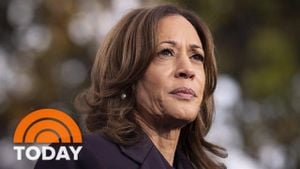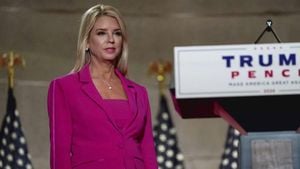Donald Trump's latest cabinet selections for his second administration have become mired in controversy, as numerous nominees are facing serious allegations of sexual misconduct. This fallout has raised questions about accountability and the ethical standards expected of those appointed to serve at high levels of government.
Among the most prominent of these nominees was Matt Gaetz, the former congressman from Florida, who was intended to be the next Attorney General. Gaetz's nomination unraveled dramatically when he announced his withdrawal from consideration, just hours after troubling details surfaced concerning investigations by the House Ethics Committee. The committee had heard testimony about alleged sexual encounters Gaetz had with underage individuals.
Gaetz has consistently denied any wrongdoing, having previously been investigated by the Justice Department over accusations related to sex trafficking. While those allegations were brought to light, officials did not pursue charges against him. Nonetheless, the negative scrutiny around his past—including his connection to convicted sex offender Joel Greenberg—persisted. Greenberg had pleaded guilty to sex trafficking involving minors and had implicated several others but did not name Gaetz directly. This connection raised eyebrows, leading to Gaetz’s eventual withdrawal from the AG nomination.
With Gaetz stepping back, Trump quickly made another choice: Pam Bondi, the former Attorney General of Florida and one of Trump's staunchest allies. Bondi had represented Trump during his impeachment trial and is well-acquainted with the former president's inner circle. Yet, even this pick isn't free from controversy. Critics have questioned whether her close ties to Trump will hinder her objectivity and ability to uphold justice.
The fallout over Gaetz highlights what many see as part of a larger troubling pattern surrounding Trump's cabinet choices. His administration is characterized by nominees facing past allegations or questionable ethical standards. Another nominee, Pete Hegseth, famed for his role as a Fox News host, has been accused of sexual assault dating back to 2017. While police decided not to press charges, Hegseth admitted to settling with the accuser without admitting any fault. The accusations surfaced again as he was slated to become Defense Secretary.
Beyond Hegseth, Robert F. Kennedy Jr., Trump's pick for Secretary of Health and Human Services, also faces sexual misconduct allegations. A former babysitter has claimed Kennedy made unwelcome sexual advances during her employment. Though Kennedy has claimed to have no recollection of the incidents, some observers are left questioning the integrity needed for such leadership roles.
Even Linda McMahon, another cabinet nominee who has held previous positions, is embroiled in allegations of enabling sexual misconduct during her tenure with WWE. Survivors have accused the organization of fostering a culture of abuse facilitated by its leadership, which McMahon was part of. While she denies any wrongdoing and calls the claims baseless, the spotlight remains on her potential leadership over educational initiatives.
Then there's Elon Musk, nominated to lead the newly established Department of Government Efficiency, whose own workplace has come under fire. Former SpaceX employees have alleged sexual misconduct claims against him, pointing to a pattern of harassment and demeaning treatment of women within the company. This has raised alarms about whether such behavior could translate to federal leadership.
Despite the plethora of allegations, Trump's communications team remains unconcerned. After the announcement of Gaetz’s fallout, spokesperson Steven Cheung remarked, “This purposeful leaking of classified investigative materials is the sort of politicized D.O.J. weaponization.” Trump himself has deflected by insisting on the legitimacy of his selections, emphasizing their qualifications.
Yet, the series of allegations begs the question: what is the standard for nominees? If previous administrations led by different presidents encountered significant backlash for far lesser infractions, could Trump’s cabinet withstand the same scrutiny? There is historical precedence for integrity being a requirement for nominees, as seen during the Clinton administration with the fallout of “Nannygate,” where the administration lost not one, but two cabinet picks due to improper hiring practices involving undocumented workers.
Currently, Trump’s cabinet reflects broader societal issues about accountability and the past behavior of figures within it. The pattern of connections to sex scandals among nominees suggests more than mere coincidence; it indicates potential challenges to moral leadership necessary for those serving the public. Trust and ethical behavior are tremendously needed by those appointed to serve, and the scrutiny surrounding these nominations could prove to shape the path of Trump’s second administration significantly.
These controversies are symptomatic of larger political dynamics where the partisan divide seems to overshadow ethical discourse. With Trump asserting himself back on the political stage, it's clear the path forward will encounter bumps, especially when past legacies of accountability are judged against present selections. How the public grapples with these issues could set new benchmarks for political accountability across future administrations.



